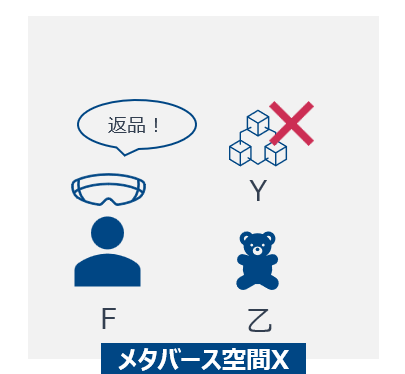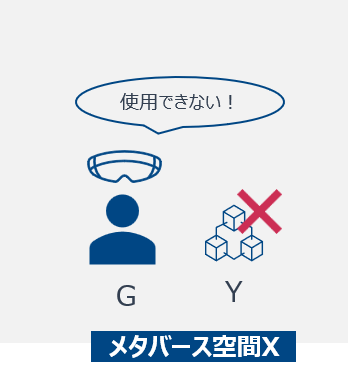
Possibilities and Regulations of the Metaverse
Attempts to create a virtual space on a computer that began around the 1980s have incorporated elements such as SNS, online games, and e-commerce, and in recent years have come to be called the “Metaverse.” On the Metaverse platform, unique economic spheres are expanding, such as interacting with others by operating avatars and conducting consumption behavior such as product purchases in virtual space.
The spread of NFTs (Non-Fungible Tokens) is also boosting the market, and the market is expanding further. In addition to media and entertainment, it is expected that the Metaverse will be used in various fields such as education and retail.
On the other hand, the laws and regulations related to the Metaverse business are extremely wide, and it is necessary to pay attention to various laws and regulations such as transaction and financial regulations, intellectual property, and data. Therefore, as a series, we will introduce a wide range of laws and regulations related to the Metaverse.
Continuing from the last time, this time, we will focus on the “Laws on Metaverse x Transactions”, focusing on the fact that transactions on the Metaverse are usually conducted non-face-to-face, and will explain laws and regulations related to consumer protection. To do.
Features of Metaverse x Law
Regarding the Metaverse, the specific legal system is not sufficiently developed at present. Therefore, when a business operator enters the metaverse business,
- Trading perspective
- Rights protection perspective
It is necessary to consider mainly the following regulations and legal issues.
Regulatory and legal issues from a trading perspective
- Digital content is the target of transactions: arrangement of relationships with civil law ownership rights, etc.
- Cross-border transactions are conducted: arrangement of applicable law and jurisdiction, etc.
- Transactions on non-face-to-face platforms
(1) Dealing with transactions and impersonation by minors
(2) Dealing with consumer protection, etc. - Digital currencies such as crypto-assets are the mainstream of settlement: Sorting out the relationship with financial regulations, etc.
Regulatory and legal issues from the perspective of rights protection
- Possibility of infringement of digital content created by various companies and individuals in the Metaverse: Sorting out the relationship with copyright and other intellectual property rights
- Potential infringement of privacy, honor, and moral rights: securing remedies for rights infringements, etc.
In the previous article, I explained 3 (1) of the regulatory and legal issues from the perspective of transactions, so in this article3(2) Legal Issueswill be explained using a hypothetical example.
Metaverse x Laws on transactions (including laws on transactions on non-face-to-face platforms)
Relationship with consumer protection (specified commercial transaction law)
Example:
Mr. F wanted to purchase item Y, which can be used in Metaverse space X, but purchased item B by mistake, so he wants to return item B.

When mail-order sales are conducted through the Internet, etc., it is clear that the seller intends to accept the offer by means of communication based on the indication, and the consumer can apply for purchase after receiving the indication ( = In other words, if you run a business such as an EC site on the Metaverse space), it corresponds to the advertisement stipulated in the Act on Specified Commercial Transactions, so certain items are displayed in the advertisement (so-called ” Indication based on “) is required (Article 11 of the Act on Specified Commercial Transactions).
And if the seller of item Y in the hypothetical example is the operator of Metaverse space X, the Metaverse space operator must display the above. On the other hand, for example, if item Y is sold by exhibitor C, who rents space in metaverse space X, and C has received an application from Mr. F to conclude a sales contract, C also It may also be liquidated when advertising obligations arise.
In addition, if the seller is required to display information based on the Act on Specified Commercial Transactions, such as Hei, the seller’s own address and telephone number must be displayed. However, in the Metaverse space, there are cases where sellers (especially sole proprietors such as virtual YouTubers) do not want their contact information such as address and phone number to be known.
In this case, after fulfilling the following certain requirements announced by the Consumer Affairs Agency in “Specified Commercial Transaction Act Guide ‘Mail Order Advertising Q&A’ Q18”, instead of the seller’s own address and phone number, the platform operator (For example, the address and phone number of the operator of the Metaverse space) can be considered.
In addition, under the Civil Code, it is stipulated that a contract cannot be canceled based on a mistake in the case of gross negligence such as input errors (Article 95, Paragraph 3 of the Civil Code). On the other hand, Article 3 of the Electronic Contract Act stipulates that if the business operator does not take measures to confirm the true intention, it can be canceled even if there is gross negligence.
For this reason, in providing actual services, it is necessary to (1) set up a screen that allows consumers to clearly confirm that they will be expressing their intention to apply by clicking the application button, and (2) set up a ” It is conceivable to set a screen that displays the contents of the application as a “final confirmation screen” and gives an opportunity to make corrections there.
Relationship with consumer protection (standard terms and conditions)
Example:
Operator A in Japan, which operates Metaverse Space X, wants to change the terms of use and create new provisions to limit its own liability.

The set of terms and conditions, such as the terms of use, that are prepared in advance for the purpose of being used as the content of the contract when a business operator conducts a standard transaction with an unspecified number of parties is called a “standard agreement.” In order for the standard contract prepared by the business operator to be part of the contract with the user, it is necessary to satisfy one of the following requirements (Article 548-2, Paragraph 1 of the Civil Code).
- When the modification of the fixed form conforms to the general interests of the other party.
- Changes to the standard terms and conditions do not conflict with the purpose of the contract, the necessity of the change, the appropriateness of the content after the change, whether or not there is a provision that the standard terms and conditions may be changed according to the provisions of this article, and whether or not When it is reasonable in light of the circumstances related to the content and other changes.
Therefore, as in the hypothetical case, if the business operator intends to establish new provisions in the terms of use that are disadvantageous to users, it is necessary to follow the procedure for changing this standard contract.
Relationship with Consumer Protection (Consumer Contract Act)
Example:
Although Mr. G purchased item Y that can be used in metaverse space X, he was unable to use item Y after purchase, so he wants to file a claim for damages.

Under the Consumer Contract Act, when a business operator exempts or limits liability for damages that a business operator bears based on voluntary provisions of the Civil Code, Commercial Code, etc., in a consumer contract, the effect of the special contract is invalidated. (Article 8, Paragraph 1 of the Consumer Contract Act).
- A clause that exempts the consumer from all liability for damages caused by a business operator’s default or tort (performed in relation to the performance of an obligation)
- Clauses that partially exempt consumers from liability for damages caused by default or tort due to intentional or gross negligence of business operators
Therefore, in preparation for cases such as hypothetical cases, business operators stipulate exemption from liability on the part of the business operator in the terms of use, etc. must be
Please note that due to the revision of the Consumer Contract Act (issued on June 1, 2022, scheduled to be enforced on June 1, 2023), a clause that invalidates the salvage clause has been added. A salvage clause is a clause in the terms of use or contract that has an unclear scope of exemption to avoid the pursuit of responsibility from the consumer.
Therefore, for example, when setting an upper limit on the amount of compensation for damages, it is necessary to clearly state to what kind of actions of the operator the exemption applies, such as “except in cases where the company is intentionally or grossly negligent.” I have.
lastly
As described above, this time, focusing on the fact that economic transactions are conducted in the Metaverse space, I have explained the regulations related to transactions on non-face-to-face platforms, especially from the perspective of consumer protection, among the laws related to Metaverse x Transactions. . From the next time onwards, we will explain other laws related to transactions, laws related to Metaverse × financial regulations, and laws related to Metaverse × intellectual property.
Especially in the intellectual property part, we will explain the laws and regulations related to NFTs and tokens exchanged on the Metaverse, and the relationship between intellectual property rights and content on the Metaverse such as skins that can be attached to digital twins and avatars. .
ZeLo, a law firm, has been providing legal advice to many clients regarding the metaverse business, making use of the knowledge gained through research and practice focusing on the potential of blockchain and crypto-assets since before they became popular. In 2022, we will launch a team that specializes in three web fields such as blockchain, crypto assets, NFT, and metaverse, and have established a system that can provide more specialized services.
We also accept consultations at spots, so please feel free to contact us.
Related: Law firm ZeLo/Foreign law joint venture official website
The post Commentary on Metaverse-related laws and regulations using the example of “addressing consumer protection” | Contribution to Law Firm ZeLo appeared first on Our Bitcoin News.

 2 years ago
169
2 years ago
169















 English (US) ·
English (US) ·